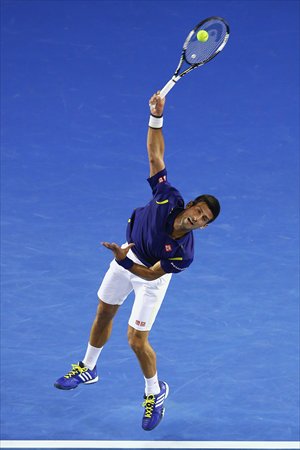It’s a fix
Over a century of match-rigging in sport

World No.1 tennis player Novak Djokovic has called for those making corruption allegations to provide proof after blasting as "absurd" an Italian newspaper which suggested he could have thrown a match. Photo: CFP
The Australian Open is the start of the tennis year and normally all eyes are on Melbourne solely for the tennis but not this year. The tournament beginning coincided with the release of a joint yearlong investigation by Buzzfeed News and the BBC into match-fixing in the sport.
"The Tennis Racket" by Heidi Blake and John Templeton has sent shock waves through the game. In it the reporters argue that files in their possession prove the extent of endemic match-fixing within the game. They go on to argue that a core group of 16 players within the top 50 - including winners of singles and doubles titles at Grand Slam tournaments - have been repeatedly pointed out to the game's governing body as exhibiting behavior indicative of fixing matches. At least half of them are playing in the Australian Open.
The news hasn't come as a complete shock to everyone. Many players past and present have alluded to collusion between players and gambling syndicates as being an "open secret" on the pro tour, and tennis set up its integrity unit to investigate such instances after a 2008 report into match-fixing.
The truth is that match-fixing is not a new phenomenon in professional sport, nor is it limited to tennis. As long as there has been professional sport, there has been temptation to influence the outcome of games, for one reason or another. Here is a look back at over a century of rigged matches from across the sporting world.
1896 - Stoke City v Burnley
The Football League was in its infancy in the 1890s, having been founded in 1888 just three years after the Football Association had permitted professional status for footballers. In the 1895-96 season the promotion and relegation between the First Division and the Second Division was still decided by a round robin playoff format and founding members of the Football League Stoke City and Burnley went into the final game knowing that a draw would see them both retain their top-flight status for the next season. They played out what Jonathan Wilson describes as a "shameful 0-0 draw" and stayed up at the expense of Newcastle United and Blackburn Rovers. The Football League saw the error of their ways and abandoned the playoff system for automatic promotion and relegation, while also expanding the First Division to allow the wronged clubs into the top flight.
1919 - the Black Sox Scandal
Baseball's World Series in 1919 was played out in an era when club owners held all of the bargaining power with regard to player contracts and wages and in Chicago, the White Sox dressing room was divided on how best to improve their lot. The factions - later called the "Clean Sox" and the "Black Sox" - were united in their hatred of owner Charles Comiskey but some fell victim to the temptation of gamblers looking to rig results to beat the bookmakers. It is alleged that at a meeting on September 21, 1919, at New York's Ansonia Hotel that some of the White Sox decided to throw the upcoming series against the Cincinnatti Reds. Chicago went down 5-3 in the best-of-nine series but the fallout saw eight of their players banned from baseball and the installation of a Commissioner of Baseball to rid the game of its gambling addiction.
1947 - Jake La Motta v Billy Fox
The Bronx Bull later became famous outside of the ring thanks to Robert de Niro's portrayal of him in the 1980 movie Raging Bull but back in 1947, La Motta was a hotly tipped middleweight on the rise in professional boxing. Thus it was a shock that the favorite was to lose against Billy Fox, who knocked him out in the fourth round of their fight in New York. Suspicions were so high that La Motta had taken a dive at the behest of the mafia - who were widely acknowledged to control the sport in the United States at the time - that the purse for the fight was withheld and he was suspended. La Motta admitted that the fix was so obvious during the fight that anyone in Madison Square Garden who did not know what was going on would have to have been "dead drunk."
La Motta was granted a shot at the world title by his mob paymasters, which he won by defeating Marcel Cerdan in 1949, but was also investigated by the FBI.
2000 - India v South Africa
International cricket was hit for six at the turn of the century when it was revealed that South Africa captain Hansie Cronje had accepted money from a Delhi bookmaker to throw one-day matches against India. What started as a phone call intercepted by Indian police ended with a slew of household names being implicated in the scandal. Pakistan's Salim Malik, who was the first cricketer to be jailed for involvement in match-fixing, India's Mohammed Azharuddin and Cronje's own teammate Herchelle Gibbs were handed bans ranging from six months to life for their involvement.
2012 - Stephen Lee
Snooker star Stephen Lee was once world No.5 but is currently in the midst of a 12-year ban, which ends in October 2024, that has effectively ended his career. Lee was the most high-profile potter to be found guilty of taking payments to influence the outcome of games for a series of infractions that included the 2009 China Open and the 2009 World Championship. Still protesting his innocence, Lee is currently living on state benefits in England.